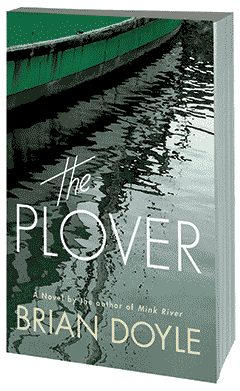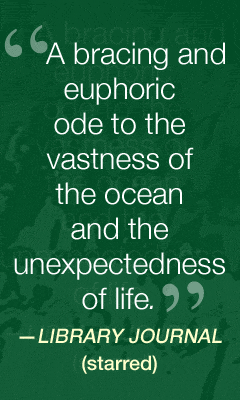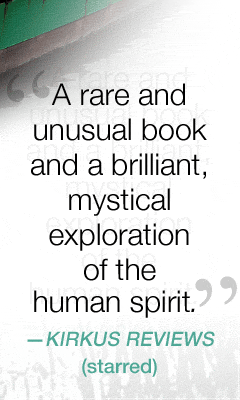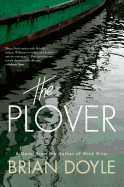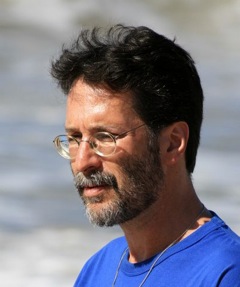The Plover
by Brian Doyle
If there's one thing Brian Doyle's fiction has in abundance, it's joyful exuberance. The exuberance begins with the epigraph to his new novel, The Plover, or, rather, the epigraphs--three of them. Robert Louis Stevenson writes to Henry James about how much he loves being at sea, "never wearied." George Harrison says that "Every one of us has within us a drop of [the] ocean." Annie Dillard tells us, "The sea pronounces something, over and over, in a hoarse whisper; I cannot quite make it out."
Portland, Ore., resident Doyle has written fiction, including his oh so buoyant and funny Mink River; nonfiction (The Grail, a guide to the pleasures of pinot noir); essays, more than a few of those; and poetry, one collection entitled Thirsty for the Joy (water & joy, again!). The Plover is first and foremost a sea story, a picaresque one, but it's also, as most fine literature certainly is, about something else, and this captivating novel really is something else.
Declan O Donnell, our hero, is a huge fan of the sea and the writings of Edmund Burke. He was last seen at the end of Mink River, scrounging around for a mainsail in the hold of his boat: "Good that I leave. Maybe it's best that I leave." Now he's back, pilot of the Plover, a small boat the "size of a roomy coffin." It was once a small trawler, but has been fitted with a mast like "a grade-school flagpole" and is now ready for coastal sailing--the Oregon coast, that is. But it was last seen heading directly west from the coast, "no destination known." As Declan tells us, "I am on a voyage to nowhere, and in no hurry to get there neither." The Plover is silently "scuttling on the ceiling of the sea."
Early on, a gull joins him and Declan talks to her, like Tom Hanks did to his fellow castaway, Wilson the soccer ball. "Bird! [A]re you in this for the long haul?" The gull remains a constant guest. But Declan "felt the absence of his kind like a new hole in his flinty soul. He sobbed... until he was empty," then fell asleep:
"As Declan slept, the Plover drifted over a vent in the ocean floor around which gathered blind crabs as white as snow, and nameless fish with transparent heads, and creatures never seen yet by the eyes of man; but we have seen them in our deepest dreams looming out of the dark, with eyes of fire."
But he's not completely alone. Accompanying him on this sea are objects (he keeps a list). Here are half a bottle of wine, a plastic turtle, a tiny head of a sea lion pup, a very old basketball, a ukulele, every sort of tampon and more--including a ship, dead ahead. It's Declan's first encounter with Enrique and his ship, Tanets. "You want beer?" Enrique says, "Maybe we will shoot you and take your boat." They don't, they leave, but they will return, like the pirates they are. Then, out of nowhere, an island, and a native in a canoe with a letter for Declan (!). It's from his friend Piko; he knew Declan would eventually pass this way. (At one point our omniscient narrator says, "What is this, an eighteenth-century novel?")
Piko's daughter, Pipa, brain-damaged and crippled, is with him on the island. They join Declan on the Plover. Pipa is strange, but in a nice way. She is able to make sounds that speak to birds: "They mewed and stared at Pipa as if waiting for something to be said... a message to be conveyed... but she only sat there under her fluttering white hair, her hands fluttering like wings." All kinds of birds, "all of them talking at once in myriad languages." She also knew "how to see inside dark places without using your eyes... how to sleep with her eyes open." And she could "hear people coming from a long way away."
As for the story of his whole life so far, Declan says, "The thing I learned most in my work is that whatever you are sure of don't be, and as soon as you think you know something for certain, you don't." And then there's the matter of that persistent "fecking hole" in the Plover that Declan patches over and over again because the "ocean is a professional assassin, my friend."
And so the adventures continue. Piko is shanghaied by Enrique, while an enormous intruder, Taro, from Enrique's ship, comes aboard. Other people are met and welcomed--a mysterious boy from a forested land and a minister exiled because he was too much of a visionary. Perhaps Doyle should have subtitled his novel The Plover: In Which Our Sea-Faring Hero Declan O Donnell, Gentleman Sailor, Encounters Diverse and Unique Peoples, Lands, and Adventures. Is he the new Tristram Shandy?
There's certainly some of the Irishman Laurence Sterne here. Indeed, there's more than a bit of the Irish in The Plover, and Irish writers in particular. "Old Ed Burke," for sure, that "[b]rilliant Irish guy." Add a dash of Beckett's absurd logic, a dram of Flann O'Brien's witty playfulness and, of course, the Joyce of Finnegans Wake.
The Plover is a fun ride with meaning and heart, lots of it, as well as jokes, scares, storms at sea, surprises, magic, absurdity--and humanity, exuberant joyful humanity. A lot of that. As we're told: "What could be better than this." --Tom Lavoie



